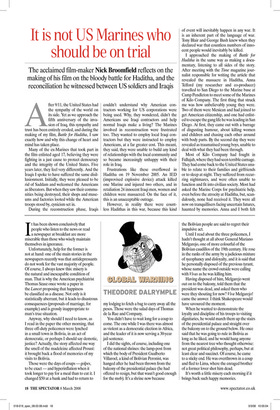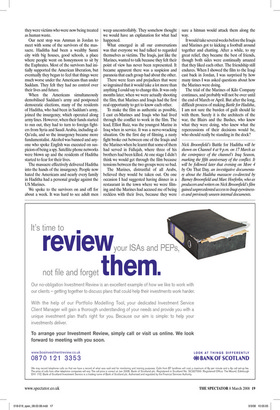It is not US Marines who should be on trial
The acclaimed film-maker Nick Broomfield reflects on the making of his film on the bloody battle for Haditha, and the reconciliation he witnessed between US soldiers and Iraqis After 9/11, the United States had the sympathy of the world on its side. Yet as we approach the fifth anniversary of the invasion of Iraq, this sympathy and trust has been entirely eroded, and during the making of my film, Battle for Haditha, I saw exactly how and why this change of heart and mind has taken place.
Many of the ex-Marines that took part in the film enlisted aged 17, believing they were fighting in a just cause to protect democracy and the integrity of the United States. Five years later, they feel very differently. And the Iraqis I spoke to have suffered the same disillusionment. Initially, they were pleased to be rid of Saddam and welcomed the Americans as liberators. But when they saw their communities being destroyed, their shops and museums and factories looted while the American troops stood by, cynicism set in.
During the reconstruction phase, Iraqis couldn’t understand why American contractors working for US corporations were being used. Why, they wondered, didn’t the Americans use Iraqi contractors and help normal Iraqis make a living? The Marines involved in reconstruction were frustrated too. They wanted to employ local Iraqi contractors but they were instructed to employ Americans, at a far greater cost. This meant, they said, they were unable to build any kind of relationships with the local community and so became increasingly unhappy with their role in Iraq.
Frustrations like these overflowed in Haditha on 19 November 2005. An IED (improvised explosive device) attack killed one Marine and injured two others, and in retaliation 24 innocent Iraqi men, women and children were massacred. On the face of it, this is an unacceptable outrage.
However, in reality there were countless Hadithas in this war, because this kind of event will inevitably happen in any war. It is an inherent part of the language of war. Tony Blair and George Bush knew when they declared war that countless numbers of innocent people would inevitably be killed.
I approached the making of Battle for Haditha in the same way as making a documentary, listening to all sides of the story. After meeting with the Time magazine journalist responsible for writing the article that revealed the massacre in Haditha, Anna Telford (my researcher and co-producer) travelled to San Diego to the Marine base at Camp Pendleton to meet some of the Marines of Kilo Company. The first thing that struck me was how unbelievably young they were. Two of them were Mexican and had joined to get American citizenship, and one had enlisted to escape the gang life he was leading in San Diego. At first, they came out with a barrage of disgusting humour, about killing women and children and chasing each other around with body parts. By the second day they were revealed as traumatised young boys, unable to deal with what they had been through.
Most of Kilo Company had fought in Fallujah, where they had seen terrible carnage. They had come back to the United States unable to relate to their families and girlfriends or to sleep at night. They suffered from recurring nightmares, and were often unable to function and fit into civilian society. Most had asked the Marine Corps for psychiatric help, even before the atrocity at Haditha, but, scandalously, none had received it. They were all now on tranquillisers facing uncertain futures, haunted by memories. Anna and I both felt they were victims who were now being treated as human waste.
Our next stop was Amman in Jordan to meet with some of the survivors of the massacre. Haditha had been a wealthy Sunni city with big houses, good schools, a place where people went on honeymoon to sit by the Euphrates. Most of the survivors had initially supported the American liberation, but eventually they began to feel that things were much worse under the Americans than under Saddam. They felt they had no control over their lives and future.
When the Americans simultaneously demobilised Saddam’s army and postponed democratic elections, many of the residents of Haditha, who had been in Saddam’s army, joined the insurgency, which operated along army lines. However, when their funds started to run out, they had to turn to foreign fighters from Syria and Saudi Arabia, including alQa’eda, and so the insurgency became more fundamentalist. Alcohol was banned and anyone who spoke English was executed on suspicion of being a spy. Satellite phone networks were blown up and the residents of Haditha started to fear for their lives.
The massacre effectively delivered Haditha into the hands of the insurgency. People now hated the Americans and nearly every family in Haditha had a personal grudge against the US Marines.
We spoke to the survivors on and off for about a week. It was hard to see adult men weep uncontrollably. They somehow thought we would have an explanation for what had happened.
What emerged in all our conversations was that everyone we had talked to regarded themselves as victims. The Iraqis, just like the Marines, wanted to talk because they felt their point of view has never been represented. It became apparent there was a suspicion and paranoia that each group had about the other.
There were fears and prejudices that were so ingrained that it would take a lot more than anything I could say to change this. It was only months later, when we were actually shooting the film, that Marines and Iraqis had the first real opportunity to get to know each other.
To make the film as authentic as possible, I cast ex-Marines and Iraqis who had lived through the conflict to work in the film. The lead, Elliot Ruiz, was the youngest Marine in Iraq when in service. It was a nerve-wracking situation. On the first day of filming, a nasty fight broke out between one of the Iraqis and the Marines when he learnt that some of them had served in Fallujah, where three of his brothers had been killed. At one stage I didn’t think we would get through the film because tensions between the two groups were so bad.
The Marines, distrustful of all Arabs, believed they would be taken out. On one occasion I had suggested having dinner in a restaurant in the town where we were filming and the Marines had accused me of being reckless with their lives, because they were sure a hitman would attack them along the way.
It would take several weeks before the Iraqis and Marines got to kicking a football around together and chatting. After a while, to my great relief, they became the best of friends, though both sides were continually amazed that they liked each other. The friendship still endures. When I showed the film to the Iraqi cast back in Jordan, I was surprised by how many times I was asked questions about how the Marines were doing.
The trial of the Marines of Kilo Company continues, and probably will not be over until the end of March or April. But after the long, difficult process of making Battle for Haditha, I am not sure the burden of guilt should lie with them. Surely it is the architects of the war, the Blairs and the Bushes, who knew what they were doing, who knew what the repercussions of their decisions would be, who should really be standing in the dock?
Nick Broomfield’s Battle for Haditha will be shown on Channel 4 at 9 p.m. on 17 March as the centrepiece of the channel’s Iraq Season, marking the fifth anniversary of the conflict. It will be followed later that evening on More 4 by On That Day, an investigative documentary about the Haditha massacre co-directed by Barney Broomfield and Marc Hoeferlin, who as producers and writers on Nick Broomfield’s film gained unprecedented access to Iraqi eyewitnesses and previously unseen internal documents.



















































































 Previous page
Previous page